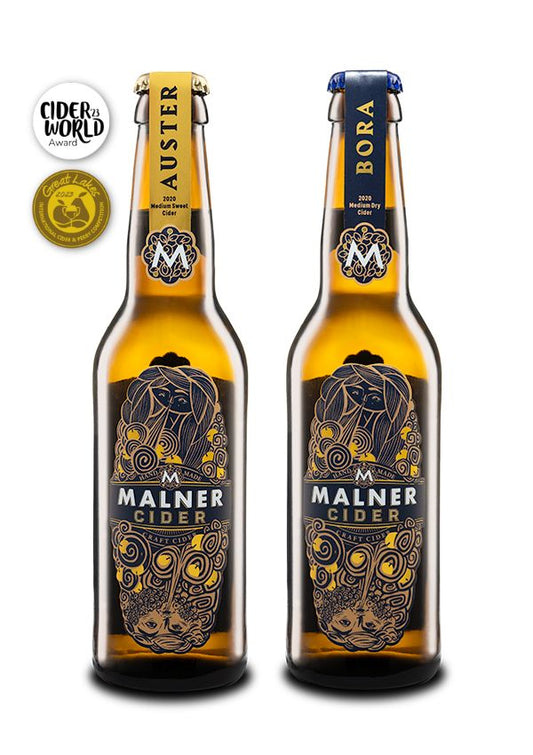Each bottle of cider represents a unique story of the apple tree. Craft cider, like wine made from grapes, is a seasonal drink that bears the mark of each year's harvest.
Cider makers create unique vintages that reflect the weather conditions of that year. Each season brings different challenges and opportunities, as the weather has a strong influence on the quality and taste of the apples, which in turn determine the final product.
The basic raw material for cider is cider (fermented apple juice), which is created each autumn. The apples are picked, ground and pressed into apple juice, which is prepared for the fermentation process. The fermentation process takes about three weeks, after which the cider is matured in barrel for at least six months. Each year we create a cider with its own vintage, and none is the same as the previous one. The vintages differ in taste, alcohol level, acids, aromas and colours.
Influence of the location of Malner orchards
Our orchards are located at the crossroads of the Mediterranean and the Brkino hills, where the cold nights and hot days give the apples unique conditions for achieving high aromatic, sugar and full-bodied flavours.
The location is exceptionally sunny with fertile soil, standing like an oasis in the middle of the karst terrain, at an altitude of 450 m above sea level, above the valley of the river Glinščice and the karst edge, with a magnificent view of Trieste and the Gulf of Trieste.
The soil is quite clayey, which also gives the cider its character. The character is also honed by the winds, especially the local gale. Throughout history, the orchard land has always been cultivated, and peaches, pears and vines once grew here. Today, old vine terraces can still be seen in the area, overgrown in the forest.
Impact of weather conditions
Apples are exposed to different weather challenges throughout the year, which directly affects their development and, consequently, their taste.
- Prolonged periods of rain can cause apples to crack or absorb water excessively, leading to lower sugar content and a change in flavour that cider producers do not want.
- A prolonged period of extremely high temperatures can halt the development of apples over a period of time, which can affect the ripening dynamics of the apples and consequently the taste. Too much sun can also cause sunburn.
- A too small temperature difference between day and night leads to slower ripening of the apples, lower sugar content and an insufficiently full apple flavour.
- Halt physically damages apples, which can lead to rapid rotting. It can also damage the blossom if it occurs during flowering, which means that part of the crop is lost.
- Frost destroys blossoms and young fruit, drastically reducing yields.
- Drought reduces the flavour and juiciness of apples. The apple tree may even shed part of its crop to protect itself.
Vintage 2024
Fortunately, the apples escaped the spring frosts, allowing them to develop normally. The beginning of summer brought enough rain to give the soil sufficient water reserves, but the long heat wave in August took its toll. Apples tolerate temperatures of up to 30 °C, which is considered to be the breaking point, but this year's higher temperatures have caused sunburn. Dark spots have appeared on some apples. Nevertheless, the sunny days have resulted in a higher sugar content, which will give the cider a richer character than average.
The 2024 cider has already undergone primary fermentation and will continue to mature in barrel for a few months. It will then be used as a base for secondary fermentation in our permanent ciders such as Auster and Bora, as well as in other products that will remain secret for the time being.
Each bottle of cider is a direct reflection of nature, which is constantly guiding and directing us. This is what makes our cider so special and unique. It reflects the inimitability of the moment of our work and dedication that we capture in your glass of cider.










